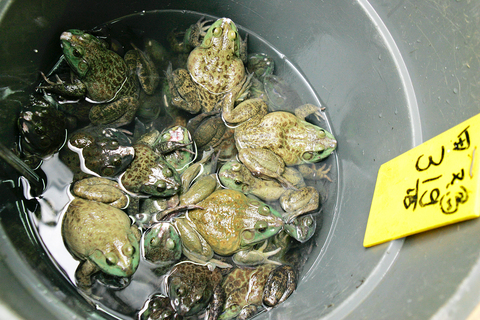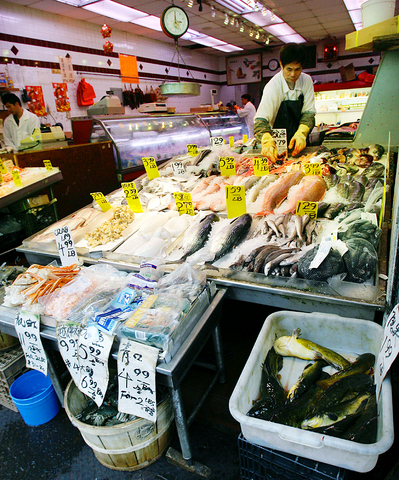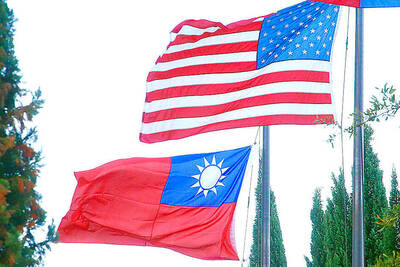When a food safety inspector walked into a market in the borough of Queens, he noticed the store had an interesting special posted on its front window: 12 beefy armadillos.
In Brooklyn, inspectors found 6.7kg of iguana meat at a West Indian market and 90kg of cow lungs for sale at another market.
At a West African grocery in Manhattan, the store was selling smoked rodent meat from a refrigerated display case.

PHOTO: AP
All was headed for the dinner table. All was illegal. Such food can spread nasty bacteria like salmonella or botulism.
Authorities say the discoveries are part of a larger trend in which markets across New York are buying meat and other foods from unregulated sources and selling them to an immigrant population accustomed to more exotic fare.
State regulators have increased enforcement measures, confiscating 65 percent more food through September than they did in all of last year.

PHOTO: AP
The seizures also focus on the eating habits of this ethnically diverse city, where everything from turtles and fish paste to frogs and duck feet make their way onto people's plates.
"At one time or another, we've probably seen about everything," said Joseph Corby, director of the state's Division of Food Safety and Inspection.
In an attempt to stop the activity, Corby's agency has increased efforts, working with the Food and Drug Administration, to prevent the illicit food from reaching store shelves.
Corby said his inspectors are also targeting warehouses that receive imported products -- Russian, Asian and African -- from where the food is distributed.
So far, it appears the campaign has been effective. In the first nine months of the year, inspectors across the state seized 720,000kg of food, destroying about 81 percent. Last year, the state seized 439,234kg.
Food taken by Corby's inspectors lacked proper labeling or did not come from a government licensed or inspected source.
Other food was destroyed because of the way it was processed or prepared, like chicken smoked in the home and placed on sale.
"Immigrants coming from the Third World would not be schooled in the issues of cross contamination and would not intuitively know hygiene standards," said Dr. Pascal James Imperato, a former city health commissioner who spent six years in Africa with the US Centers for Disease Control and Prevention.
"They don't know how simple contamination can result in a widespread epidemic," he added.
The law varies from animal to animal.
Bush meat, or anything killed in the wild, is typically illegal, Corby said. Eating endangered or threatened species like as gorilla and chimpanzee -- whose meat is occasionally found in New York -- is against the law.
But turtles, frogs, iguana and armadillos can be eaten under one condition: The meat must come from a licensed and inspected facility.
"We have yet to find too many of these places," Corby said.
State sanitary inspection reports dating back to 2001 reveal a widespread appetite for potentially dangerous food.
In Manhattan's Chinatown, Bor Kee Food Market has been caught selling unidentified red meat. Down the street at Dahing Seafood Market, inspectors have found frogs being sold from an unapproved source.
"That's a no-no because there is absolutely no monitoring of the standards in these places," said Dr. Philip Tierno, author of The Secret Life of Germs: Observations and Lessons from a Microbe Hunter, and director of clinical microbiology at New York University Medical Center.
"It's subject to the vagaries of whoever is processing the food. Who's watching?" he said.
In a city filled with people from all over the world, the law can get lost in translation.
At the West African Grocery -- where "smoked rodent" was found -- the owner failed to explain why he was selling the mysterious meat, saying he could not speak English.
At another market in Brooklyn called Chang Xiang Trading, the manager shrugged her shoulders when confronted with reports showing the store has sold illegal pork, chicken and ducks. Her English was not good, she said.
Sung Soo-kim, president of Korean American Small Business Service Center of New York, says it is hard to change centuries-old eating habits.
Kim runs a state-approved food safety education program and has delivered seminars to the Korean community about food laws.
Corby says that one way to get businesses to comply with the program is ordering them to take a state-approved food inspection course.
If all else fails, Corby will get a court injunction and close stores, something the state did 66 times last year and 72 times through September this year.
"We either clean them up or close them down," he said. "There is a high standard that is applied. We'd rather have it too high than too low."

NATIONAL SECURITY: The Chinese influencer shared multiple videos on social media in which she claimed Taiwan is a part of China and supported its annexation Freedom of speech does not allow comments by Chinese residents in Taiwan that compromise national security or social stability, the nation’s top officials said yesterday, after the National Immigration Agency (NIA) revoked the residency permit of a Chinese influencer who published videos advocating China annexing Taiwan by force. Taiwan welcomes all foreigners to settle here and make families so long as they “love the land and people of Taiwan,” Premier Cho Jung-tai (卓榮泰) told lawmakers during a plenary session at the Legislative Yuan in Taipei. The public power of the government must be asserted when necessary and the Ministry of

Proposed amendments would forbid the use of all personal electronic devices during school hours in high schools and below, starting from the next school year in August, the Ministry of Education said on Monday. The Regulations on the Use of Mobile Devices at Educational Facilities up to High Schools (高級中等以下學校校園行動載具使用原則) state that mobile devices — defined as mobile phones, laptops, tablets, smartwatches or other wearables — should be turned off at school. The changes would stipulate that use of such devices during class is forbidden, and the devices should be handed to a teacher or the school for safekeeping. The amendments also say

EMBRACING TAIWAN: US lawmakers have introduced an act aiming to replace the use of ‘Chinese Taipei’ with ‘Taiwan’ across all Washington’s federal agencies A group of US House of Representatives lawmakers has introduced legislation to replace the term “Chinese Taipei” with “Taiwan” across all federal agencies. US Representative Byron Donalds announced the introduction of the “America supports Taiwan act,” which would mandate federal agencies adopt “Taiwan” in place of “Chinese Taipei,” a news release on his page on the US House of Representatives’ Web site said. US representatives Mike Collins, Barry Moore and Tom Tiffany are cosponsors of the legislation, US political newspaper The Hill reported yesterday. “The legislation is a push to normalize the position of Taiwan as an autonomous country, although the official US

CONSISTENT COMMITMENT: The American Institute in Taiwan director said that the US would expand investment and trade relationships to make both nations more prosperous The US would not abandon its commitment to Taiwan, and would make Taiwan safer, stronger and more prosperous, American Institute in Taiwan Director Raymond Greene said. “The US’ commitment to Taiwan has been consistent over many administrations and over many years, and we will not abandon our commitment to Taiwan, including our opposition to any attempt to use force or coercion to change Taiwan’s status,” he said in an exclusive interview with the Liberty Times (the sister newspaper of the Taipei Times) on Friday last week, which was published in the Chinese-language newspaper yesterday. The US would double down on its efforts